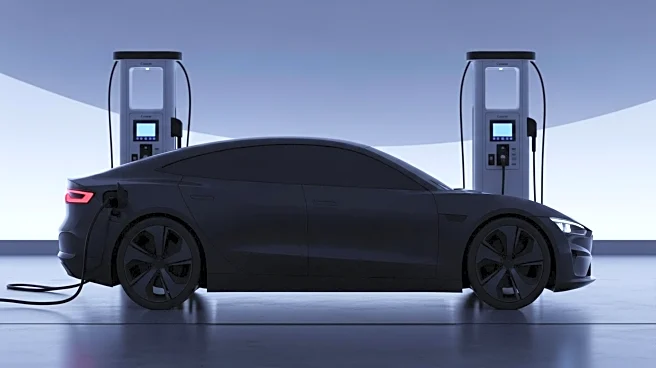What is the story about?
What's Happening?
Tesla has introduced entry-level versions of its Model Y and Model 3, aiming to make electric vehicle ownership more accessible. These new configurations are stripped-back versions of existing models, reducing the entry price for potential buyers. The Model Y Standard Rear-Wheel Drive starts at $39,990, offering an EPA-estimated range of 321 miles and a peak charging rate of 225 kW. It features a 69 kWh battery and produces approximately 300 horsepower. The Model 3 Standard Rear-Wheel Drive is priced at $36,990, sharing similar specifications with a 69 kWh battery and a range of 321 miles. Both models have simplified interiors, focusing on essential features while maintaining Tesla's signature driving experience.
Why It's Important?
This move by Tesla is significant as it addresses the growing demand for more affordable electric vehicles amidst rising average vehicle transaction prices in the U.S. By offering lower-cost options, Tesla is likely to attract first-time EV buyers who may have previously considered cheaper alternatives. This strategy could expand Tesla's market share and reinforce its position as a leader in the EV industry. The introduction of these models aligns with Tesla's original mission to provide long-range, fast-charging electric vehicles that remain cutting-edge, potentially increasing the adoption of EVs across the country.
What's Next?
Tesla's new affordable models are expected to impact the EV market by encouraging other manufacturers to offer competitive pricing. As these models become available, consumer interest in electric vehicles may rise, prompting further advancements in EV technology and infrastructure. Tesla's focus on software and driving dynamics remains intact, which could continue to attract tech-savvy consumers. The company may also explore global pricing strategies to expand its reach beyond the U.S. market.
Beyond the Headlines
The introduction of these affordable models may influence the broader automotive industry to prioritize cost-effective solutions without compromising on quality. This shift could lead to increased investment in EV technology and infrastructure, supporting the transition to sustainable transportation. Additionally, Tesla's approach highlights the importance of balancing innovation with accessibility, potentially setting a precedent for other tech-driven industries.
















